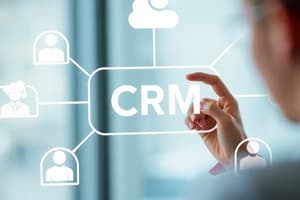Podcast
Questions and Answers
A company wants to automate its lead assignment process and streamline its email campaigns. Which type of CRM would be most suitable?
A company wants to automate its lead assignment process and streamline its email campaigns. Which type of CRM would be most suitable?
- Collaborative CRM
- Analytical CRM
- Strategic CRM
- Operational CRM (correct)
A business seeks to identify customer purchase patterns to target high-value clients. Which CRM type is most helpful?
A business seeks to identify customer purchase patterns to target high-value clients. Which CRM type is most helpful?
- Collaborative CRM
- Distribution CRM
- Operational CRM
- Analytical CRM (correct)
A company aims to enhance communication between its sales, marketing, and support teams. Which CRM type is the best fit?
A company aims to enhance communication between its sales, marketing, and support teams. Which CRM type is the best fit?
- Promotional CRM
- Operational CRM
- Collaborative CRM (correct)
- Analytical CRM
Which of the following is NOT a primary benefit of using a CRM system?
Which of the following is NOT a primary benefit of using a CRM system?
A B2B company with long sales cycles and multiple stakeholders would MOST benefit from a CRM system that provides:
A B2B company with long sales cycles and multiple stakeholders would MOST benefit from a CRM system that provides:
A company notices a high churn rate among new customers. Which CRM benefit would be MOST relevant in addressing this issue?
A company notices a high churn rate among new customers. Which CRM benefit would be MOST relevant in addressing this issue?
To measure the effectiveness of a recent advertising campaign, which CRM benefit would a marketing manager utilize?
To measure the effectiveness of a recent advertising campaign, which CRM benefit would a marketing manager utilize?
A customer service representative needs to quickly understand a customer's past interactions to resolve a complaint efficiently. Which CRM benefit is MOST applicable?
A customer service representative needs to quickly understand a customer's past interactions to resolve a complaint efficiently. Which CRM benefit is MOST applicable?
Which of the following is the primary goal of implementing a CRM system?
Which of the following is the primary goal of implementing a CRM system?
A company notices that its sales team spends a significant amount of time on administrative tasks. How could CRM technology address this issue?
A company notices that its sales team spends a significant amount of time on administrative tasks. How could CRM technology address this issue?
What benefit does a CRM system provide in terms of customer data management?
What benefit does a CRM system provide in terms of customer data management?
Which component of CRM focuses on the business philosophy of prioritizing customers in all organizational decisions?
Which component of CRM focuses on the business philosophy of prioritizing customers in all organizational decisions?
A marketing team wants to launch a targeted campaign to increase sales among a specific group of customers. How can CRM support this initiative?
A marketing team wants to launch a targeted campaign to increase sales among a specific group of customers. How can CRM support this initiative?
A customer support representative needs to quickly understand a customer’s past interactions with the company. How does CRM facilitate this?
A customer support representative needs to quickly understand a customer’s past interactions with the company. How does CRM facilitate this?
What function of CRM helps a sales team monitor and manage potential clients throughout their purchasing journey?
What function of CRM helps a sales team monitor and manage potential clients throughout their purchasing journey?
A company wants to evaluate the success of its customer retention strategies. How can a CRM system assist in this evaluation?
A company wants to evaluate the success of its customer retention strategies. How can a CRM system assist in this evaluation?
Which of the following exemplifies a CRM application in customer retention for a subscription-based service?
Which of the following exemplifies a CRM application in customer retention for a subscription-based service?
How does CRM contribute to converting satisfied customers into brand ambassadors?
How does CRM contribute to converting satisfied customers into brand ambassadors?
What benefit does a business gain from using dynamic website content within a CRM framework?
What benefit does a business gain from using dynamic website content within a CRM framework?
How does integrating social media scheduling into a CRM system primarily assist a marketing team?
How does integrating social media scheduling into a CRM system primarily assist a marketing team?
Predictive analytics within a CRM system can help anticipate customer needs. Which of the following scenarios best demonstrates this capability?
Predictive analytics within a CRM system can help anticipate customer needs. Which of the following scenarios best demonstrates this capability?
In what way do automated SMS reminders contribute to improved business operations within a CRM system?
In what way do automated SMS reminders contribute to improved business operations within a CRM system?
Which aspect of loyalty campaigns, when managed through a CRM system, directly encourages repeat purchases?
Which aspect of loyalty campaigns, when managed through a CRM system, directly encourages repeat purchases?
A telecom company uses a CRM to send updates about data plans and exclusive offers. What primary goal does this exemplify?
A telecom company uses a CRM to send updates about data plans and exclusive offers. What primary goal does this exemplify?
Which of the following scenarios BEST exemplifies how a B2C company leverages CRM?
Which of the following scenarios BEST exemplifies how a B2C company leverages CRM?
A company wants to improve its marketing, sales, and customer service operations. How can CRM address this?
A company wants to improve its marketing, sales, and customer service operations. How can CRM address this?
A marketing manager aims to launch more effective and personalized campaigns. How would they use CRM for customer segmentation?
A marketing manager aims to launch more effective and personalized campaigns. How would they use CRM for customer segmentation?
An online retailer seeks to improve customer retention by tailoring their messaging. How can CRM assist in targeting customers at different lifecycle stages?
An online retailer seeks to improve customer retention by tailoring their messaging. How can CRM assist in targeting customers at different lifecycle stages?
A non-profit organization is looking to enhance its donor engagement. How can they BEST leverage CRM for this purpose?
A non-profit organization is looking to enhance its donor engagement. How can they BEST leverage CRM for this purpose?
A customer service manager notices inconsistencies in how different representatives interact with customers. What CRM capability would MOST directly address this issue?
A customer service manager notices inconsistencies in how different representatives interact with customers. What CRM capability would MOST directly address this issue?
A gym is trying to increase membership engagement. Which of the following strategies, enabled by CRM segmentation, would be MOST effective?
A gym is trying to increase membership engagement. Which of the following strategies, enabled by CRM segmentation, would be MOST effective?
A new online business is launching and wants to use CRM to turn satisfied customers into brand advocates. Which CRM strategy would be MOST appropriate?
A new online business is launching and wants to use CRM to turn satisfied customers into brand advocates. Which CRM strategy would be MOST appropriate?
Flashcards
Operational CRM
Operational CRM
Streamlines and automates sales, marketing, and service.
Analytical CRM
Analytical CRM
Analyzes customer data to inform business decisions.
Collaborative CRM
Collaborative CRM
Improves communication between departments and with customers.
Enhanced Customer Experience
Enhanced Customer Experience
Signup and view all the flashcards
Improved Sales Performance
Improved Sales Performance
Signup and view all the flashcards
Better Marketing ROI
Better Marketing ROI
Signup and view all the flashcards
Increased Customer Retention
Increased Customer Retention
Signup and view all the flashcards
Efficient Team Collaboration
Efficient Team Collaboration
Signup and view all the flashcards
CRM (Customer Relationship Management)
CRM (Customer Relationship Management)
Signup and view all the flashcards
Goal of CRM
Goal of CRM
Signup and view all the flashcards
CRM as a Technology
CRM as a Technology
Signup and view all the flashcards
CRM as a Strategy
CRM as a Strategy
Signup and view all the flashcards
CRM as a Process
CRM as a Process
Signup and view all the flashcards
Centralizing Customer Data
Centralizing Customer Data
Signup and view all the flashcards
Automation of Tasks (in CRM)
Automation of Tasks (in CRM)
Signup and view all the flashcards
Customer Segmentation
Customer Segmentation
Signup and view all the flashcards
B2C (Business-to-Consumer)
B2C (Business-to-Consumer)
Signup and view all the flashcards
NfP (Not-for-Profit)
NfP (Not-for-Profit)
Signup and view all the flashcards
Centralised Source
Centralised Source
Signup and view all the flashcards
Demographics
Demographics
Signup and view all the flashcards
Behavior
Behavior
Signup and view all the flashcards
Psychographics
Psychographics
Signup and view all the flashcards
Lifecycle Stages
Lifecycle Stages
Signup and view all the flashcards
CRM for Customer Lifecycle
CRM for Customer Lifecycle
Signup and view all the flashcards
Retention and Loyalty Campaigns
Retention and Loyalty Campaigns
Signup and view all the flashcards
CRM Personalization Capabilities
CRM Personalization Capabilities
Signup and view all the flashcards
Benefits of Personalization
Benefits of Personalization
Signup and view all the flashcards
Automated Campaign Capabilities
Automated Campaign Capabilities
Signup and view all the flashcards
Benefits of Automated Campaigns
Benefits of Automated Campaigns
Signup and view all the flashcards
Turning Customers into Ambassadors
Turning Customers into Ambassadors
Signup and view all the flashcards
CRM's Role in Customer Lifecycle
CRM's Role in Customer Lifecycle
Signup and view all the flashcards
Study Notes
- CRM (Customer Relationship Management) refers to the strategies, processes, and technologies that businesses use to manage and analyze their interactions with current and potential customers.
- The goal of CRM is to improve customer relationships, enhance customer satisfaction, and drive sales growth by providing better service and understanding customer needs.
Core Components of CRM
- CRM as a Technology are software tools that help businesses collect, organize, and analyze customer data.
- Popular CRM platforms include Salesforce, HubSpot, Zoho CRM, and Microsoft Dynamics 365.
- CRM as a Strategy is defined as a business philosophy centered around placing the customer at the core of business processes and decision-making.
- CRM as a Process means applying a systematic approach to managing customer relationships through lead generation, customer support, satisfaction, retention and loyalty programs.
Key Functions of CRM
- Centralizing Customer Data combines customer information from various touchpoints (email, calls, social media, purchases) into a single system.
- Centralizing Customer Data ensures all departments have access to the same data for consistency.
- Automation of Tasks streamlines repetitive tasks like sending follow-up emails or scheduling calls.
- Automation of Tasks increases efficiency and frees up time for strategic activities.
- Customer Segmentation groups customers based on demographics, purchase behavior, or other criteria.
- Customer Segmentation helps tailor marketing messages and offers.
- Lead Management tracks potential customers throughout the sales funnel.
- Lead Management ensures timely follow-ups to maximize conversions.
- Improved Customer Support tracks customer interactions to provide personalized support.
- Improved Customer Support enables faster resolution of issues by accessing customer history.
- Analytics and Reporting tracks KPIs like sales growth and customer retention rates.
- Analytics and Reporting provides insights into customer behaviors and campaign performance.
Types of CRM
- Operational CRM focuses on streamlining and automating business processes like sales, marketing, and service such as automating email campaigns or lead assignment.
- Analytical CRM focuses on analyzing customer data to make informed decisions such as identifying high-value customers through purchase trends.
- Collaborative CRM focuses on improving communication between different departments and customers, for example, sharing customer feedback across sales, marketing, and support teams.
Benefits of CRM
- CRM enhances Customer Experience by personalizing interactions based on customer data.
- CRM enhances Customer Experience by resolving issues faster with a complete history of interactions.
- CRM Improves Sales Performance by tracking leads through the sales funnel.
- CRM Improves Sales Performance by automating repetitive tasks to focus on closing deals.
- CRM improves Marketing ROI by targeting the right audience with segmented campaigns.
- CRM Improves Marketing ROI by measuring campaign effectiveness with detailed analytics.
- CRM Increased Customer Retention by identifying at-risk customers and implementing retention strategies.
- CRM Increased Customer Retention by engaging existing customers with loyalty programs and personalized offers.
- CRM enables Efficient Team Collaboration by centralizing data for seamless communication between departments.
- CRM enables Efficient Team Collaboration by aligning marketing, sales, and service teams for a unified customer experience.
- Technology plays a critical role in fostering and maintaining customer relationships by streamlining data management, personalizing customer experiences, and automating engagement.
CRM Technology Usage Within Organizational Types
- B2B (Business-to-Business) enables businesses to manage long sales cycles, nurture leads, and track interactions with multiple stakeholders.
- Ex: A software company uses Salesforce to monitor interactions with enterprise clients, manage follow-ups, and track sales pipeline.
- B2C (Business-to-Consumer) focuses on high-volume, shorter sales cycles and personalizing customer experiences.
- Ex: An e-commerce company uses HubSpot to manage customer purchase history, recommend products, and track abandoned carts.
- NfP (Not-for-Profit) helps organizations manage donor relationships, track donations, and run engagement campaigns.
- Ex: A nonprofit uses Zoho CRM to track volunteer registrations, organize fundraising events, and communicate with donors.
Role of CRM Technology in Centralising Customer Data
- CRM systems serve as a single source of truth for customer data, consolidating contact details, interaction history (emails, calls, and chats), purchase history, support tickets, feedback and preferences.
- Teams across departments (sales, marketing, customer service) can access real-time data, ensuring consistent communication and better customer experiences.
- Ex: A retail brand uses a CRM to track customer preferences, enabling its marketing team to send personalized offers and its support team to address complaints effectively.
Customer Segmentation
- CRM tools allow organizations to segment customers based on demographics (age, gender, income level), behavior (purchase frequency, product preferences), psychographics (lifestyle, interests, values), and engagement (active vs. inactive customers).
- Benefits of Segmentation enable targeted campaigns for different audience groups, help prioritize high-value customers, and increases the relevance of marketing efforts.
- Ex: A gym uses CRM to segment members into groups such as frequent gym-goers, new members, and those who haven't visited recently, tailoring promotions for each group.
Targeting Customers at Different Lifecycle Stages
- Lifecycle Stages include Awareness to introduce prospects to the brand.
- Lifecycle Stages include Consideration to engage and educate leads.
- Lifecycle Stages include Purchase to convert leads into customers.
- Lifecycle Stages include Retention to encourage repeat purchases.
- Lifecycle Stages include Advocacy to turn satisfied customers into brand ambassadors.
- CRM Tracks where customers are in the lifecycle, Automates stage-specific messaging and offers, and Provides insights into customer behaviors to optimize engagement strategies.
- Ex: An online fashion retailer uses CRM to send discount codes to new customers (purchase stage) and loyalty rewards to frequent buyers (retention stage).
Creation of Retention and Loyalty Campaigns
- Retention Campaigns regularly communicate with existing customers to maintain engagement and satisfaction with tools like email newsletters, SMS updates, and personalized offers.
- Ex: A telecom provider sends regular updates about data plans and exclusive offers to retain subscribers.
- Loyalty Campaigns use reward programs to encourage repeat purchases with tools like point systems, tiered rewards, and special discounts.
- Ex: A coffee chain uses CRM to offer free drinks after a certain number of purchases and turns satisfied customers into brand ambassadors.
- CRM tracks where customers are in the lifecycle, automates stage-specific messaging and offers, and provides insights into customer behaviors to optimize engagement strategies.
Personalization Capabilities and Their Benefits
- Personalization Capabilities include personalized emails with customer names, past purchase data, and tailored product recommendations.
- Personalization Capabilities allow for dynamic website content that adjusts based on user behavior, and predictive analytics to anticipate customer needs.
- Personalization Improves customer satisfaction and engagement, builds stronger emotional connections with the brand, and increases conversion rates and ROI.
- Ex: A streaming service uses CRM to recommend TV shows or movies based on a user's watch history.
Automated Campaign Capabilities and Their Benefits
- Automated Campaign Capabilities include automated email marketing (drip campaigns triggered by user actions, e.g., welcome emails after sign-up), SMS reminders to notify customers of upcoming appointments or subscription renewals, and Social media integration to schedule and post updates directly from the CRM.
- Automated Campaigns save time and reduces manual effort, ensures consistent communication with customers, and improves scalability of marketing efforts.
- Ex: An airline uses CRM to automatically send flight check-in reminders and post-trip surveys to passengers.
Studying That Suits You
Use AI to generate personalized quizzes and flashcards to suit your learning preferences.



